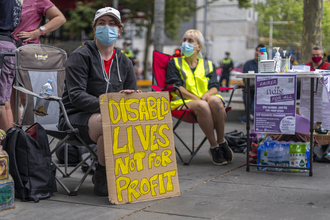- Featured
- Asylum Seekers and Migrants
- Climate and Environmental Justice
- Disability Justice
- Economic Justice
- Education
- First Nations Justice
- Health and Medicare
- International Solidarity
- LGBTIQA+ Rights
- Media and Arts
- Occupational Health and Safety
- Public Services
- Public Transport
- Racial Justice
- Social Justice
- Women's Rights
- Workers' Rights
- More
-
Don’t Leave Behind Tassie’s Allied Health Professionals in Schools, Child Safety and Youth Justice“I have a neurodiverse child with multiple diagnoses. He’s been on a waiting list since before Kindy. We’ve only just been able to start seeing a specialist – but not in Tasmania. We’re seeing a private specialist interstate, via Zoom. We desperately need more Allied Health Professionals to support kids who are doing it tough.” – Thirza, Parent, Secretary (CPSU Tasmania) Allied Health professionals in schools are essential to give kids with learning and developmental disabilities the best start in life. Getting access to quality care early in life gives kids the best chance to adjust, succeed and flourish. An estimated 1 in 20 Australian children struggles with an anxiety disorder¹; 15-20% of Australians has a language-based learning disability². Early years are our first and best chance to give kids dignity and support to succeed. Tasmania also has the third highest rate of children and young people in Out-of-Home Care. Only a fraction of those we miss will ever seek help later in life. They go on struggling, in silence. Getting access to a Social Worker, Speechie or Psychologist early on can make all the difference in the world. “1 in 8 Australian primary school students has a communication disorder of some kind. We have 31 speech pathologists to service every public primary school and support school in the state. That makes our ratio 116 to 1, at best. We’re not talking about a little bit of understaffing - we’re talking about chronic, long-term vacancies.” - Sarah, Advanced Skills Speech & Language Pathologist, Tasmania Please sign our petition to call on Premier Rockliff to ensure Allied Health Professionals in schools, child safety and youth justice aren’t left behind. ¹ https://www.aihw.gov.au/reports/children-youth/australias-children/contents/health/children-with-mental-illness ² https://dyslexiaassociation.org.au/frequently-asked-questions-2/181 of 200 SignaturesCreated by CPSU Tasmania
-
We Need Both! Online and In-person options for Tertiary EducationOnline options were ‘too hard’ before 2020, and then they came within a week, and then they were taken away as quickly as they were given. Many members of our community depend on these options being available such as those who are immuno-compromised and cannot risk exposure to disease, especially when universities do not have open windows, air purifiers or a mask or vaccine mandate in the classroom. Universal Design (‘UD’) — specifically, Universal Design for Learning (‘UDL’) — is a research-backed pedagogy and curriculum framework which enables equitable access to education for all students, including students with disabilities and other students from diverse, minoritised backgrounds. For disabled students, implementing UDL would ostensibly ensure that they can ‘engage with the curriculum without having to seek adjustments’ (see ‘Recommendations for equitable student support during disruptions to the higher education sector: Lessons from COVID-19,’ Mercer-Mapstone et al 2022,). Hybrid, flexible education — also known as ‘hyflex’ education, as noted in Recommendation 2.1 of the ALSA-AMSA-NUS research report — entails offering educational delivery options for both in-person attendance and Work From Home (‘WFH’). Moreover, hyflex education can facilitate educational participation for not only disabled people but also women escaping domestic family violence (‘DFV’) or sexual assault, First Nations students in regional & rural Australia, international students, and other demographics for whom in-person attendance may not be the most safe & accessible. People from diverse backgrounds have value. Contrary to what many believe, disabled people can (and do) contribute to society and to building a better world. Imagine all the setbacks if Dr Steven Hawking couldn’t come to class because he couldn’t get his wheelchair in the door! Additionally, the tertiary education regulator, Tertiary Education Quality and Standards Agency (‘TEQSA’), has announced that they will now enforce the Education Services for Overseas Students Act 2000 (Cth) (‘ESOS’). Under ESOS in s 8.19, TEQSA is mandating that no more than a third of the education delivered to overseas students can be online or by distance. This decision from TEQSA means that if international students want to access regional, globally ranked education, they must return to Australia whilst there are COVID-19 outbreaks overseas, a rental shortage of affordable, student housing and a cost-of-living crisis. This forces numerous international students into a tricky conflict between their future and their present happiness. TEQSA doesn’t take individual complaints so the regulator cannot protect international students. That is why the government must step up. Likewise, online learning can be better for university staff. University staff with disabilities also face many of the struggles that disabled students do. Likewise, staff with caring roles for children or other dependents benefit from increased access to them by providing education online. Some universities do not have child-care options after 5pm, meaning that staff cannot afford to work a 9-5 with children because they have to rush to collect them. The higher education system relies on these staff and their incredible work to upskill the next generation.250 of 300 SignaturesCreated by NUS Disabilities

-
Stop the NSW Government fining striking workersUnions of nurses, teachers, paramedics, cleaners, transport workers, child protection workers and many more are saying their jobs and conditions are under immense stress. The NSW Government is ignoring their pleas for help. Workers have been left with little choice but to strike to force the government to listen. So the NSW Government has proposed fines of up to $110,000 for striking. It's unfair and undemocratic - workers will suffer in silence and their unions fined if they take action. But it can be stopped. The Liberals and National Government does not hold a majority in Parliament. If Labor, independents and just 3 minor parties team up they will have a majority to overturn the new fines. The vote is expected in early August - which means we have just a few weeks to act. Add your name to send a clear message to members of the NSW Parliament - you must use your vote to protect essential worker's rights.15,460 of 20,000 SignaturesCreated by Unions NSW
-
Government's to Ease Living CostsCost of living keeps going up while wages and conditions are continually eroded away, people receiving government support are trying to get by with just $42 a day and living in poverty. The gap between wages for men and women is still around 22.8%. The dream of owning your own home has become out of reach for too many people with rentals also becoming more unaffordable, meaning the demand for public housing is increasing.51 of 100 SignaturesCreated by Luke Martin

-
Wheelchair Access in Public SchoolsCurrently in Australia, a Royal Commission is looking into the shocking cases of violence, abuse, neglect and exploitation of people with a disability and Inclusive Education has been recommended during the hearings, utilising the UN Convention on the Rights of Persons with Disabilities, Article 9 and 24 (see reference below). These UN Articles can’t be properly implemented in our public schools unless we provide access to people who use wheelchairs. 15-20% of people in Australia have a disability. It makes sense to include disabled people in our community - we are not going away! If you have an understanding of inclusion and don't believe in segregation in our public schools, please sign this petition and share it so we can make this change for our future generations to learn to accept diversity from the time they start school. Thank you for sticking up for those who might be a little different you! Remember - it could be you next who might need to use a mobility device and need to be included... https://www.un.org/development/desa/disabilities/convention-on-the-rights-of-persons-with-disabilities/convention-on-the-rights-of-persons-with-disabilities-2.html https://disability.royalcommission.gov.au/34 of 100 SignaturesCreated by Andrea Wildin
-
Thank Essential Workers- Don't Remove SupportEssential workers have continued to turn up to work throughout the pandemic. Already there have been over 700 public servants and disability workers infected with COVID-19 at work with disability workers also infected. Already we have seen PSA members in Disability group homes, Juvenile Justice, NSW Prisons, Private Prisons, transport, and now we are experiencing 100s of school closures and exposures. From the start of the pandemic there has been presumptive legislation to support essential workers when they get COVID with workers compensation, without the impossible task of having to prove you got it at work. This protects the following workers: -public health employees, -disability facilities, -educational institutions, including pre-schools, schools and tertiary institutions -police and emergency services -transport services, -libraries, -courts and tribunals, -correctional centres and detention centres, -places of public entertainment or instruction (including, museums, galleries, cultural institutions and casinos), The government has introduced a Bill to repeal these laws, which will mean that if you get COVID at work, you have to prove that you got it at work. The NSW Government has said that this change may take over $600 million out of the hands of injured workers and cut 75% of these claims. These cuts passed the lower house in November with all the Government members. The Bill has been referred to the Upper House Committee where it is likely to be voted on in February.14 of 100 SignaturesCreated by Community and Public Sector Union

-
Save Student Wellbeing at Macquarie University1. MAJOR STUDENT WELLBEING CUTS AT MACQUARIE Macquarie University management are moving to further cut Student Wellbeing services at Macquarie University (with numerous positions being axed and/or downgraded - roles such as Psychologists, Disability Liaison Officers, Accessibility Officers, Student Wellbeing Advisors, Student Advocates, Inappropriate / Unwanted Behaviour Officer, and administrative staff). These latest cuts are on top of extensive job losses to Student Wellbeing services which management implemented in late 2020, with nine positions cut, and numerous essential vacant positions unfilled by the University. 2. THREAT TO COMPLIANCE Student Wellbeing services at Macquarie University are woefully understaffed, and the lack of resources threatens compliance with the Disability Standards for Education and Higher Education Threshold Standards. Proposed resourcing is well below established standards according to the Counselling Standards published by ANZSSA. 3. TWO PERMANENT PSYCHOLOGISTS FOR 45,000 STUDENTS Management is seeking to resource only two (2) permanent Psychologists for a University that has approximately 45,000 domestic and international students, this is severely inadequate. 4. CUTS TO SEXUAL ASSAULT SUPPORT Resources are being cut for the vital ‘Respect. Now. Always.’ service which is designed to prevent and respond to sexual assault matters, discrimination, harassment and bullying. 5. STUDENT NEEDS ARE INCREASING The number of students self-reporting a health condition has increased year on year since 2019, and staff are already struggling to keep up with student demand for wellbeing supports. 6. LOWEST IN SECTOR While other Universities are investing in student wellbeing, Macquarie University’s cuts will see students receiving some of the lowest levels of support in the sector. 7. STAFF AND STUDENTS OPPOSE THESE CHANGES These cuts highlight a critical need to strengthen the Enterprise Agreement provisions for professional staff at Macquarie University. The University is proceeding with harmful restructuring despite widespread and extensive feedback from staff and students opposing the attack on Student Wellbeing. For More Information: * Dec 2021 - Staffing cuts are out of touch with the “Australian Disability Strategy 2021-2031” committed to by the Prime-Minister and Premier of NSW on 3 December 2021, including Policy Priority 3 “Improve pathways and accessibility to further education and training for people with disability” - https://www.disabilitygateway.gov.au/document/3106 * 15 Nov 2021 - "NTEU Response to PST Change Proposals: Student Services and Faculty Professional Services" provides a detailed overview of the proposed cuts to staffing at Macquarie University (including for Student Wellbeing). https://www.nteu.org.au/library/download/id/11356 * Nov 2021 – University of Melbourne paper: "Alleviating the human cost of COVID-19 in Australian universities" highlights the need “to increasingly focus on wellbeing, support, inclusion and trust for both staff and students; this will be a key ingredient to a vibrant and healthy higher education system.” https://melbourne-cshe.unimelb.edu.au/__data/assets/pdf_file/0005/3962831/human-cost-of-covid-in-aus-unis.pdf1,188 of 2,000 SignaturesCreated by Concerned Staff and Students Macquarie University
-
Paid Isolation Leave to protect all workersWorkers have carried Australia through this pandemic. Many essential workers are still at constant risk of community or workplace exposure to COVID. As we move into the next phase of the pandemic, all workers, including casuals, must have access to Paid Isolation Leave to reduce the risk of COVID spreading, take the steps needed to keep everyone safe and without losing any income. The requirements for workers to test, trace, isolate or quarantine are going to be with us for an extended period, and could increase for people working in frontline jobs if they experience more regular exposure at work. Workers will need Paid Isolation Leave to get us through this next phase of the pandemic rather than rely on depleted or non-existent leave balances. We need Paid Isolation Leave to protect our families and communities, and stop the spread of COVID-19. Paid Isolation Leave is critical to make sure workers or someone they care for can safely test, isolate or quarantine – and keep their families, communities and workmates safe.1,151 of 2,000 SignaturesCreated by Australian Services Union
-
500 DAYS TO ENSURE PUBLIC TRANSPORT IS ACCESSIBLE FOR ALL: THE COUNTDOWN BEGINSMy life would be very different if I could hop on a bus or a train or a tram whenever I wanted. Right now going anywhere takes a lot of planning and is not affordable for me, because Public Transport is inaccessible. For over forty years people with disabilities have been campaigning for the same access to transport as everyone else, to have the same access to jobs, work and community, but for many of us lockdown life is normal life. Previous governments have not kept their promises. The Disability Discrimination Act (1992) requires that all infrastructure is fully compliant with the Standards for Accessible Public Transport 2002 (DSAPT) by 31 December 2022. That’s 500 days away. And we are woefully behind. Only 15% of Melbourne’s Tram Network is accessible, and buses, trains and taxis across regional Victoria fail daily to meet the needs of residents with disabilities. THE GOOD NEWS IS THAT THE ANDREWS GOVERNMENT CAN DEAL WITH THE SOLUTION ONCE AND FOR ALL We want to see a commitment from the state government to deliver universal access in the next term of government. This would contribute to our economic recovery and deliver a more comfortable, efficient Public Transport system for all Victorians. It would also help Victoria meet its commitment to halve emissions by 2030. And it’s not just the disability community that will benefit from universal access. Parents with prams, older Victorians and people wishing to avoid increasing traffic congestion will all reap the rewards of these upgrades. TAKE ACTION: SEND AN EMAIL TO MINISTER CARROLL HERE Support our community of disability activists by reaching out to the Minister for Public Transport, Ben Carroll, and call on him and the Victorian government to take action for universally accessible Public Transport. Jess and the DRC Campaigns Team304 of 400 SignaturesCreated by Jess and the DRC Campaigns Team
-
Award Mr Neale Daniher AO the Companion of the Order of Australia (AC)This is extremely important to all Australians as not only could Neale pass away at any moment but also because of the countless hours he puts into raising money, helping with research, hosting, organising and attending events as well as helping others despite raising over $50 million dollars for Motor Neurone Disease (MND) and suffering with it himself which is currently in the last and worse stage of the heart breaking condition not to mention the other stuff he has done outside of his campaigning and the football career he has had, therefore this man deserves no less than to be awarded the Companion of the order of Australia immediately.94 of 100 SignaturesCreated by Lord Braden Hyde

-
Demand a Fairer NDISIndependent assessments are intended to reduce spending on NDIS participants. They are part of government efforts to contain costs in the NDIS. These cuts will only increase the number of disabled people unable to access proper support and funding, and will force many disabled people into precarious positions. The cuts to the NDIS will also drive down pay and conditions for disability and mental health workers. The government says it will not introduce IAs until the second IA trial and further consultations have happened. But whatever they end up proposing, the government's plans are clear: to cut spending and exclude people from the NDIS. But we can stop them. Disabled people, disability and mental health workers, and our supporters can band together to show the widespread opposition to IAs and demand a fairer NDIS for all.117 of 200 SignaturesCreated by Fairer NDIS For All

-
Align both Disability Support PensionsStandard DSP only has a $174 per fortnight allowance for earning beyond the DSP payment. For every dollar after that, the recipient loses 50c in every $1. The effect of this is to reduce the hourly wage in earnings to around $10 per hour. This legislation, which creates a two class disability payment system, is discriminatory. We need to join together and demand that the Government provide all DSP recipients with the same level of benefits. This must be addressed immediately. If you also want a copy and paste letter to forward to your local minister, please feel free to use the following… To minister , I have recently become aware of an unfair and unjust practice of the Australian government paying 2 different disability support payments (DSP). The standard DSP is income and asset tested and restricts recipients to being renumerated for their employment to around $10 gross/hour maximum. The second category is reserved for those classified as ‘legally blind’. As this payment has no income or asset restriction, all money earned from employment is retained. As disabled people face enormous struggles in their day to day life, whether their particular disability is legal blindness, or some other disability type, all should have the same set of access to a fair pay for work undertaken. As a society we have long ago moved toward equity and as such all should be granted the second DSP. This needs to be addressed as a matter of urgency. Sincerely,195 of 200 SignaturesCreated by Carolyn Pimentel


.png)









